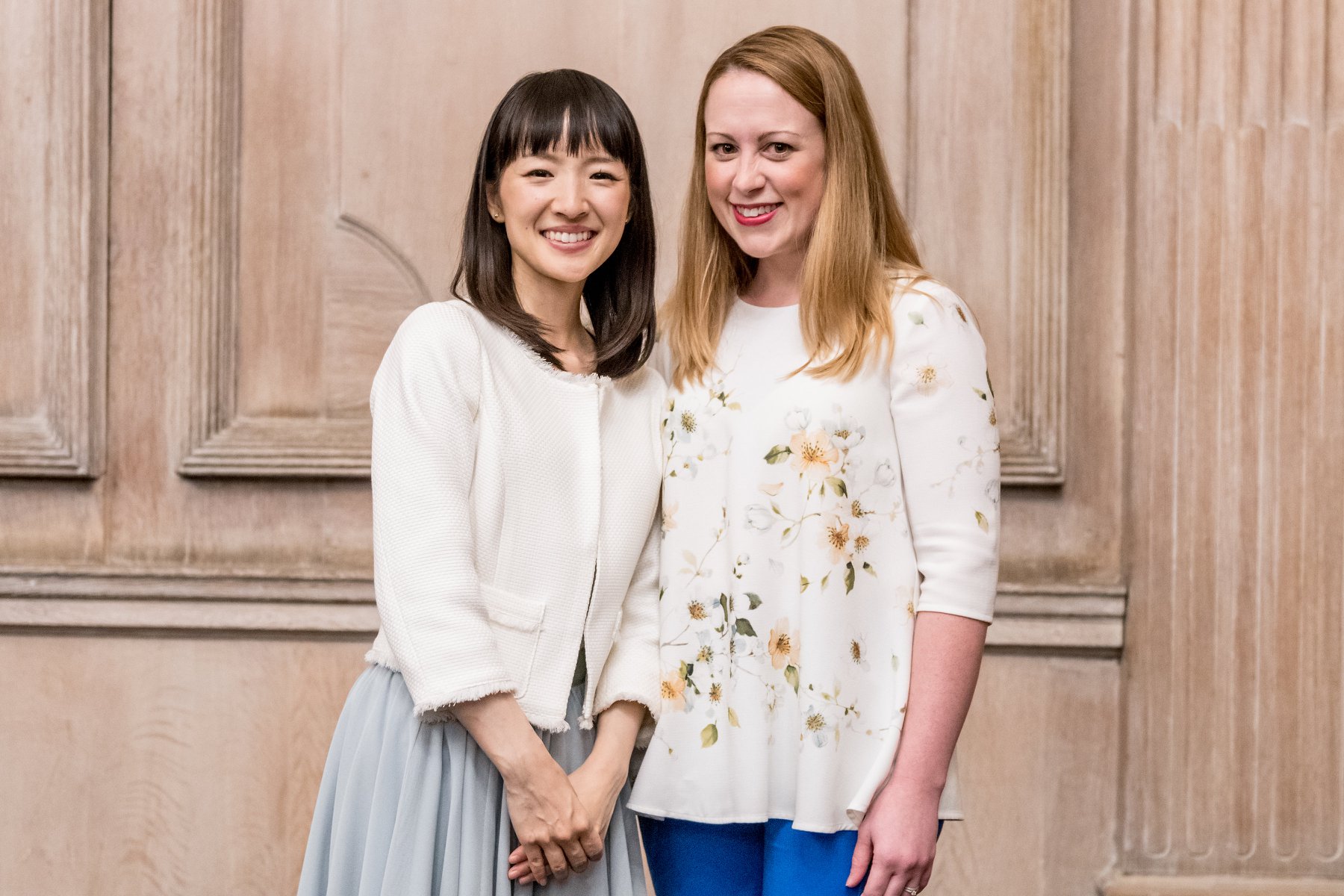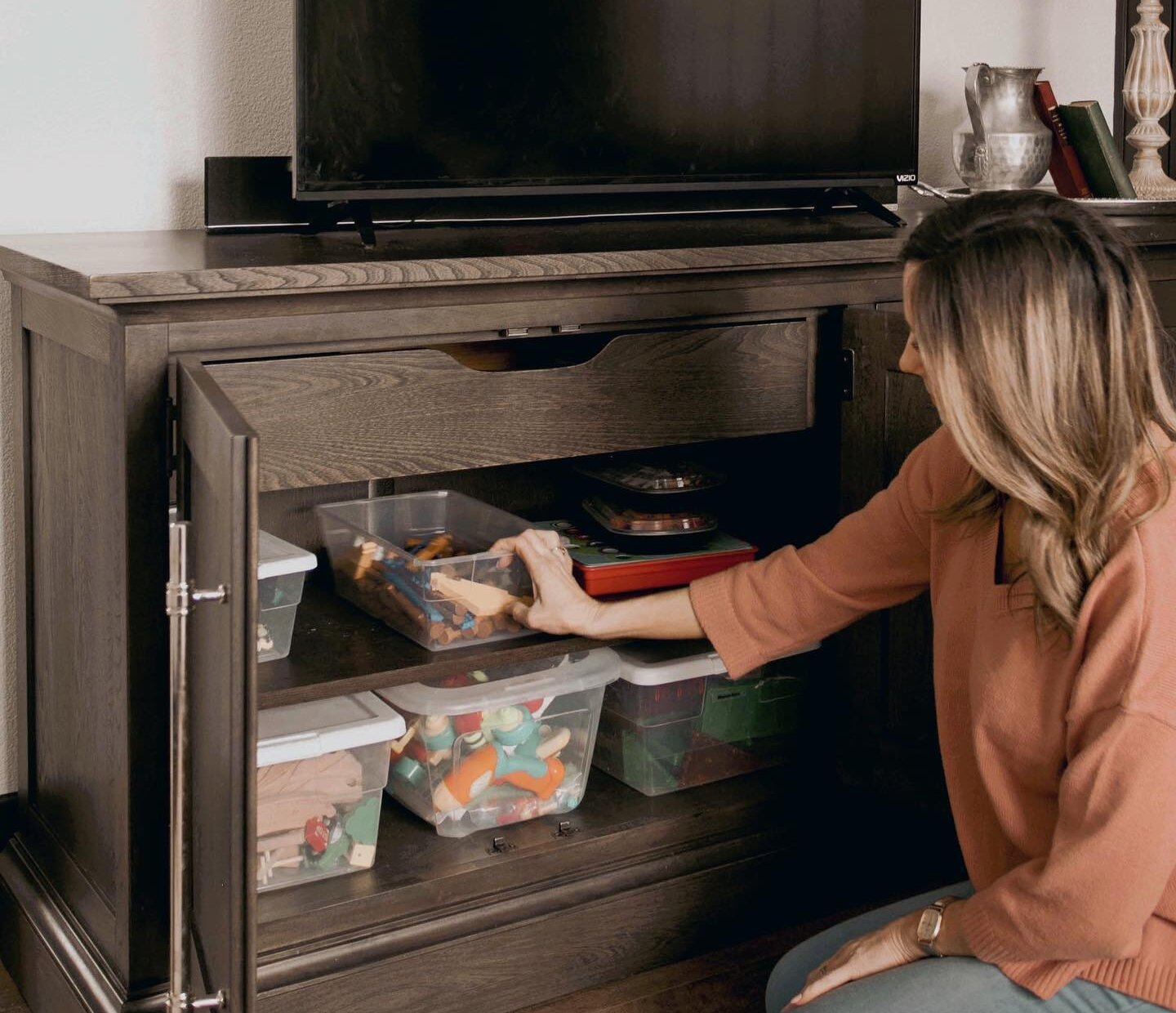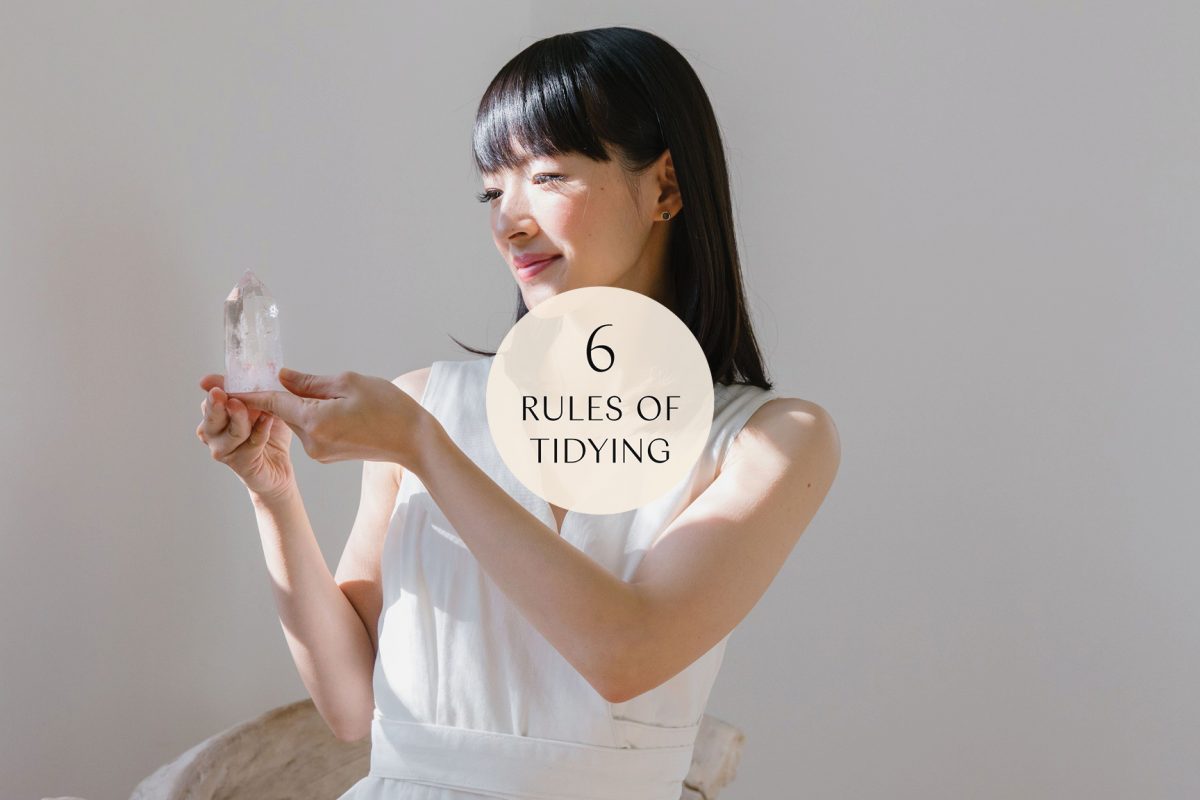There are natural-born tidiers, and then there are those among us who live for helping friends and family get organized. That is Marie Kondo’s story. Her career began at 19 when she found she had a knack for organizing friends’ dorm rooms. Now, Marie travels the world, teaching people how to organize their homes and fill their lives with joy. And you could, too.
If you’ve ever considered whether you’d be a good candidate for getting certified as a home organizer, this is the article for you. We spoke with three KonMari Consultants (all graduates of our professional organizer certification program) about finding their way into the profession and, ultimately, launching their own businesses.
Here are Pia Thompson (Sweetdigs), Katrina Hassan (Spark Joy London), and Kathryn Kelly (Refresh Organizing) on how and why they became professional organizers.
What Makes a Good Professional Organizer?
Before jumping into any professional organizing program, such as Marie Kondo’s KonMari Consultant Program, it’s important to gauge whether running your own organizing business is right for you. Our Consultants agree that the first step is considering your personality, how you like to work, and your goals.
Editor’s note: We created a free assessment quiz for anyone wondering whether an organizing career is right for them. It only takes a few minutes!
Does it fulfill you?
“At first, I wasn’t certain at all [that I wanted to become a professional organizer]!” says Pia. “I started off as a lawyer and practiced for seventeen years. Once I gave myself the space and time to think about my next step, I realized I had no idea what to do next! I left law because it didn’t feel fulfilling to me, and in fact, never had.”
After completing her own tidying festival, Pia realized that that phase – spending days organizing her own house from top to bottom – made her feel more fulfilled than her lucrative legal practice.
Do you enjoy working with people?
Because becoming a professional organizer involves spending time – a lot of time – with mostly strangers who have a wide range of personalities, it’s essential that you have a social side. This doesn’t require a full-blown extrovert personality, but it does require problem-solving, active listening and empathy skills.
“You have to love working with people – you need to be kind, considerate and genuinely interested in how you can best support someone in how to create a more joyful life,” says Katrina. “Organizing isn’t just about the physical items, it’s about leading someone through a complete and comprehensive mindset shift…Leading someone through the KonMari Method is a type of therapy, so a KonMari Consultant and professional organizer needs to be a good listener, and have a good level of awareness of when it’s best to offer advice, and when it’s an opportunity for a client to come to conclusions independently.”
“You also need to be highly adaptable,” she continues. “Every client is different, and you will need to tailor your teaching according to the needs of the client as an individual.”
Do you organize just for fun?
For Kathryn, she knew she was ready to become a professional organizer as soon as she realized that, in fact, you can help clients organize for a living. “Tidying, organizing, and fine-tuning the workflow of my environment is something I have always enjoyed (even as a child), and it comes naturally,” she says. “I considered my ability more of a ‘quirk’ than a superpower, so the moment I learned that professional organizing was a real thing, it was suddenly so clear what I was meant to do!”
“Nothing brings me more joy than the privilege to walk beside someone as they embark on their own unique tidying journey and experience life-changing results. ”

Where, When and How to Start
When it comes to the actual process of becoming a professional organizer, there’s no one-size-fits-all approach. However, consider this a loose guide based on a composite of each Consultant’s experiences.
01. Start by becoming a client yourself.
The KonMari Consultant Program requires every student to first complete a tidying festival in their own homes—it’s our way of practicing the concept of “learning by doing.” Committing to fully organizing your own home will also help you determine whether organizing as a part- or full-time job will feel fulfilling.
Our Consultants agree. “I encourage you to take yourself through the KonMari Method from start to finish as outlined in The Life-Changing Magic of Tidying Up and Spark Joy,” says Kathryn. “This will equip you to gain a solid understanding of the process, experience transformation in your own life, and help you determine if this work is well-suited for you. By embarking on your own tidying journey, you’ll acquire the empathy necessary for guiding a client through the method.”
02. Do your research on professional organizing methods.
Every professional organizing program has its own method and curriculum; some will work better for you than others. “Read as many decluttering and organizing books as you can, and once you’ve finished with those, combine this learning with books and content on effective habit change and enhancing well-being,” says Katrina. These books will help inform your work no matter which program you choose, but especially if you choose a program like KonMari’s, which emphasizes a more holistic approach to home organizing.
Pia agrees. “Listen to some podcast episodes, and chat with some pros already working as organizers,” she says. “There are so many of us listed on KonMari.com. Find out more about what the real work is like. It’s vastly different from organizing your own space.”
And don’t stop researching after you’ve entered a program – keep reading and studying over time to hone your expertise. “Never stop refining the methodology, techniques and systems you teach your clients,” Katrina says.
03. Embrace the idea of investing in yourself.
Becoming a professional organizer requires training and education, and committing involves both tuition and making time for that training in what might already be a busy schedule. Whether you’re hoping to become a part-time professional organizer, launch a side hustle or work as a professional organizer full-time, the time and money you invest in training will show its benefits as you start working with clients.
KonMari’s immersive courses take place over a weekend, which helps with finding the time, but many of our KonMari Consultants had full-time careers and/or were raising children while they trained as professional organizers. They often share that once they set their minds on the idea that they were investing in their future selves, they found ways to prioritize taking the leap in order to make major changes in their lives.
Think of getting certified as an investment in yourself and your business – and your well-being, family and lifestyle. A common story among KonMari Consultants is that they often find that they need to quit their current roles to become full-time organizers simply because they’re making more money with their organizing business – while actually working less! Here is one of their stories.
04. Sign up for a home organizing training program.
Some courses spread out training over a series of weeks, some a few days. (The KonMari Consultant Program tackles the curriculum in a three-day immersive weekend and then follows up with required practice hours and ongoing business workshops.) Some are in-person, some virtual and other programs offer both options (KonMari offers both, hosting one to two in-person trainings and about 10 virtual courses per year). Pick the format that works best for you and your schedule, but remember the research you did early on – if you’ve found a course that’s perfect for your goals and personal philosophy, dare to dive in even if it means taking a few days off from your day job!
05. Network with your program cohort.
One of the best ways to build your business is to network, and it starts with your professional organizing training. KonMari’s program places deep emphasis on creating a feeling of community between Consultants, including a robusdt Slack channel that all Consultants can join to share ideas, ask questions, and seek advice from more experienced professional organizers. Once you’ve completed your training, you’ll want to continue networking in the future, as word-of-mouth recommendations often lead to new clients.
06. Say yes to everything when you’re just getting started.
Helen Youn, one of the KonMari Consultant Program’s teachers (and a KonMari Consultant herself), hit the nail on the head when she said, “Be open to every opportunity in that first year. I said yes to everything, which brought me so many different opportunities…Also, spend time meeting different people – even if it’s just for coffee because they’re curious about what you do. Sometimes, people turn into clients; sometimes, they turn into friends. You just don’t know what’s going to come your way.”
07. Practice makes perfect.
Every home organizer has to start somewhere. After you complete your training, reach out to family and friends to complete a few practice sessions where there is less pressure than working with strangers (practice teaching is built into the KonMari Consultant program curriculum for this very reason). You can bill for your time at a “friends and family” or “apprentice” rate to begin bringing in income. Then, start pushing your comfort zone so you become more comfortable with working with different personality types.
You also need practice responding to clients who react unexpectedly to your work – the process of tidying can stir up a range of emotions and reactions. “Organizing isn’t always straightforward,” says Pia. “As an organizer, you are often faced with complicated storage or a client who springs a surprise on you…Once you start removing things from closets and cabinets, the space will look worse for a while than before you arrived! Clients need someone who will stay grounded. “
08. Launch a website and put yourself out there!
To run your own business requires building your own brand, which isn’t as complicated or as scary as it sounds! Almost every one of our KonMari Consultants has a website or Instagram account for their organizing business – and one of our most popular business workshops is on building a digital presence (KonMari Consultants receive access to five business-building workshops with their tuition). Many also take on speaking engagements or give interviews to newspapers in their towns or home countries about the Method and their experiences. Some run their own podcasts; others have written books. The common denominator: despite how uncomfortable it is to put themselves out there, they do it in the name of work that sparks joy!
The more you say yes to putting your name and work into the world, the more comfortable you will get with it – and the more clients you will land.
09. Treat your business as just that — a business.
By now, you’ve done it; you’ve started a professional organizing business, which makes you a business owner. It’s time to get set up legally. If you’re nervous about the technical side of running your own business, look for business workshops to attend (again, these come included with the KonMari Consulting Program) and consider hiring a professional accountant to help you set up your business according to local and national requirements. The more you treat your professional organizing work as a legitimate business, the more confidence you will have, and the more that business will grow!

“I love being my own boss, and being fully in control of the direction I want my business to flourish in. I’ve already been so grateful to experience a range of opportunities in my KonMari organizing business, and I’m very much looking forward to what is yet to come!”
What Sets the KonMari Method Apart from Other Professional Organizing Programs?
We’d be remiss to not call out the ways in which the KonMari Consultant Program differs from other professional organizing programs. For one, the KonMari Method is more than simply organizing a home – it’s a philosophy that our Consultants apply to every aspect of their lives from helping clients to making business decisions. That difference is also what made them pick KonMari over other programs.
“I’ve always been organized, so I considered traditional home organizing, but when I explored, I realized that it didn’t speak to me because it felt as though something was missing,” says Pia. “The way Marie connected intentionality, lifestyle, and joy with the physical things in your home spoke to me deeply. I told my friends I was starting an organizing business, to which they all said: That’s so you. I wish they told me that before I went to law school!”
Katrina agrees. “Early on in the KonMari Method, when I was tidying my physical items, I began to understand that this process is so much more the making things look tidy on the surface; KonMari is all about effective decision-making, building confidence in the choices you make and continuing to find ways to express joy and enhance wellbeing in your life,” she says. “The process was transformative. After I had gone through all of the items in my home, I began questioning if other areas of my life sparked joy, like my daily habits, my friendships and even my career as a teacher. KonMari gave me the confidence to leave a job that was leaving me feeling drained and overwhelmed and opened my eyes to a whole new world of organizing possibilities! As soon as I started to support my friends, family and members of my local community, teaching them the KonMari philosophy and supporting them in creating a joyful, organized home, I realized that I’d found my true calling.”
The Perks of Becoming a Professional Organizer
In case you aren’t already sold, we asked our three Consultants what they love most about running their own professional organizing businesses the KonMari way. Here are their final thoughts:
Pia: When clients tell me they are dancing in their kitchen the day after we complete their review of kitchen komono. How I’ve added years to their marriage because their husband now has space under the bathroom sink. How they learned that the career they are in is not for them from joy-checking their books and seeing that none of them relate to their current profession. It’s the results, the joy and the ease that the KonMari Method brings to their lives.
Kathryn: I love a good transformation! And I’m not talking about before and after photos. In this work, I get to witness transformation in my clients’ lives. Nothing brings me more joy than the privilege to walk beside someone as they embark on their own unique tidying journey and experience life-changing results.
On a personal level, I love that I’ve been able to build a business that integrates well with my life, allowing me to serve others through my work while still keeping my own house in order by prioritizing my family.
Katrina: The work/life balance it provides. As a business owner, I’m able to set my own hours and working schedule, ensuring that I protect the precious time I need to be present with my family. I love being my own boss, and being fully in control of the direction I want my business to flourish in. I’ve already been so grateful to experience a range of opportunities in my KonMari organizing business, and I’m very much looking forward to what is yet to come!



